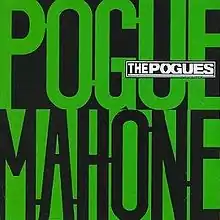Pogue Mahone
Pogue Mahone is the seventh and final studio album by The Pogues, released in 1996.[7][8] The title is a variant of the Irish phrase póg mo thóin, meaning "kiss my arse", from which the band's name is derived. It was the band's second studio album recorded after the departure of Shane MacGowan, and features Spider Stacy in the role of lead singer.[3]
| Pogue Mahone | ||||
|---|---|---|---|---|
 | ||||
| Studio album by | ||||
| Released | 27 February 1996 | |||
| Recorded | 1995 | |||
| Genre | Folk rock | |||
| Length | 43:36 | |||
| Label | WEA[1] | |||
| Producer | Steve Brown[2] | |||
| The Pogues chronology | ||||
| ||||
| Singles from Pogue Mahone | ||||
| ||||
| Review scores | |
|---|---|
| Source | Rating |
| AllMusic | |
| Robert Christgau | |
| The Encyclopedia of Popular Music | |
| Entertainment Weekly | B+[6] |
| MusicHound Rock: The Essential Album Guide | |
| The New Rolling Stone Album Guide | |
Overview
The album was not a critical or commercial success. After its release founding member Jem Finer left the band, and the remaining members decided to end their run together as well. The album yielded one single, "How Come". "Love You Till the End" was to be the second single, but this was never released.[9] The song appears in the 1999 movie Mystery, Alaska and on the soundtrack to the movie P.S. I Love You.
Critical reception
Trouser Press wrote that a "shortage of songs that are more than workably agreeable and a complete lack of edge in their performances leaves the harmless album sounding like the work of a skilled and spirited but bog-ordinary Irish pub band."[10] The Los Angeles Times wrote that "some numbers sound almost new age, thanks to an airy whistle, while others sound like dull FM-rock with a dash of Irish flavor."[11]
Track listing
Standard edition
- "How Come" (Ronnie Lane, Kevin Westlake) – 2:50
- "Living in a World Without Her" (Darryl Hunt, James McNally) – 3:20
- "When the Ship Comes In" (Bob Dylan) – 3:14
- "Anniversary" (Jem Finer) – 4:06
- "Amadie" (Andrew Ranken) – 1:53
- "Love You 'Till the End" (Darryl Hunt) – 4:32
- "Bright Lights" (Jem Finer) – 2:37
- "Oretown" (Jem Finer) – 3:50
- "Pont Mirabeau" (Guillaume Apollinaire; arranged by Jem Finer, translated by S.E. Finer and Jem Finer) – 3:31
- "Tosspint" (Jem Finer) – 3:32
- "Four O'Clock in the Morning" (Andrew Ranken) – 3:12
- "Where That Love's Been Gone" (Andrew Ranken, Steven Skull) – 3:50
- "The Sun and the Moon" (Jamie Clarke, Spider Stacy) – 3:22
Bonus tracks (2004 reissue)
- "Eyes of an Angel" (Jem Finer) – 2:54
- "Love You Till the End" (Stephen Hague Mix) – 3:54
Personnel
- The Pogues
- Spider Stacy - lead vocals
- Jem Finer - banjo, guitar, hurdy-gurdy, translation
- Andrew Ranken - drums; co-lead vocals on "Amadie"
- Darryl Hunt - bass guitar, backing vocals
- James McNally - accordion, whistle, low whistle, Uilleann pipes
- David Coulter - mandolin, ukulele, djembe, shaker, tambourine
- Jamie Clarke - acoustic guitar, electric guitar and bass guitar, backing vocals
with:
- Stephen Warbeck - mandolin, piano, accordion
- Jon Sevink - fiddle
- Caroline Lavelle - cello
- Jocelyn Pook - viola
- Julia Singleton - violin
- Sonia Slany - violin
- Anne Wood - violin
- Debsey Wykes - backing vocals
- Steve Brown - backing vocals
- Stephen Hague - backing vocals
- Technical
- Steve Brown - engineer, mixing, producer
- Stephen Hague - mixing, producer
- Mike Drake - mixing
- Steve Musters - mixing, mixing assistant
- Ian Cooper - mastering
- Shelley Saunders - assistant
- Paul Scully - live sound
- Darryl Hunt - cover design, cover art
- Claudia Pöschl - cover design, cover art
- Steve Pyke - photography, portraits
References
- The New Rolling Stone Album Guide. Simon & Schuster. 2004. p. 643.
- MusicHound Rock: The Essential Album Guide. Visible Ink Press. 1999. p. 881.
- AllMusic review
- "Robert Christgau: CG: The Pogues". www.robertchristgau.com.
- Larkin, Colin (2006). The Encyclopedia of Popular Music. Volume 6: MUZE. p. 578.CS1 maint: location (link)
- "Pogue Mahone". EW.com.
- "The Pogues | Biography & History". AllMusic.
- Thompson, Dave (20 December 2000). "Alternative Rock". Hal Leonard Corporation – via Google Books.
- "Pogues Singles". Pogues.com. 17 March 1988. Retrieved 5 March 2012.
- "Pogues". Trouser Press. Retrieved 20 December 2020.
- "ALBUM REVIEWS : * The Pogues, "Poguemahone," Mesa/Blue Moon". Los Angeles Times. 24 February 1996.
